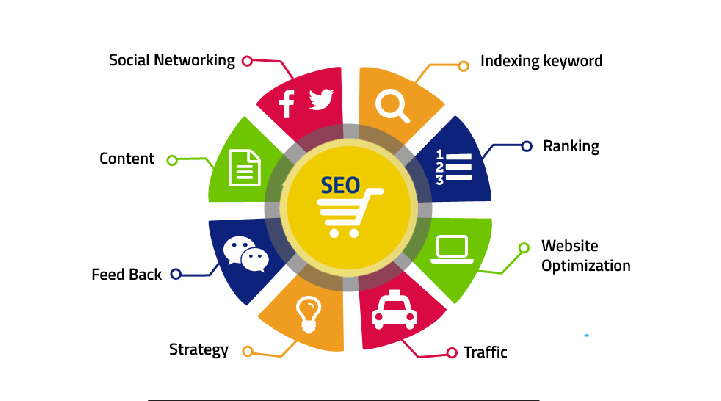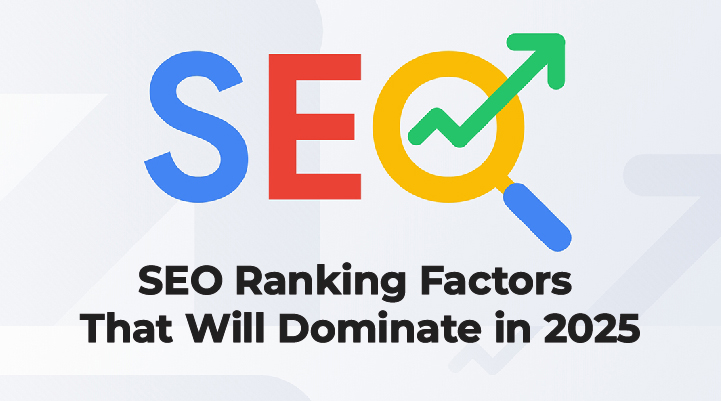Search Engine Optimization (SEO) is a dynamic and ever-evolving field. As search engines like Google continue to refine their algorithms, the factors that influence rankings are constantly changing. By 2025, the SEO landscape will be shaped by advancements in technology, shifts in user behavior, and an increased emphasis on quality, relevance, and user experience. In this comprehensive guide, we’ll explore the 10 SEO ranking factors that are expected to dominate in 2025, providing detailed insights and actionable strategies to help you stay ahead of the curve.
1. User Experience (UX) and Core Web Vitals
The Importance of User Experience
User experience (UX) has become a cornerstone of SEO, and its importance will only grow by 2025. Search engines prioritize websites that offer seamless, intuitive, and enjoyable experiences for users. A positive UX not only keeps visitors engaged but also reduces bounce rates, signaling to search engines that your site is valuable and relevant.
Core Web Vitals
Google’s Core Web Vitals are a set of metrics designed to measure the quality of user experience on a website. These metrics include:
- Largest Contentful Paint (LCP): Measures loading performance. Ideally, LCP should occur within 2.5 seconds of when the page first starts loading.
- First Input Delay (FID): Measures interactivity. Pages should have an FID of less than 100 milliseconds.
- Cumulative Layout Shift (CLS): Measures visual stability. Pages should maintain a CLS of less than 0.1.
Mobile-First Design
With mobile devices accounting for the majority of global internet traffic, mobile-first design will remain critical. Websites that are not optimized for mobile devices will struggle to rank well. Responsive design, fast loading times, and easy navigation are essential components of a mobile-friendly site.
Actionable Strategies
- Regularly audit your website’s performance using tools like Google PageSpeed Insights and Lighthouse.
- Optimize images and videos to reduce load times.
- Minimize JavaScript and CSS that block rendering.
- Implement lazy loading for images and other media.
- Ensure your website is fully responsive and provides a seamless experience across all devices.
2. E-E-A-T: Expertise, Experience, Authoritativeness, and Trustworthiness
Understanding E-E-A-T
E-E-A-T stands for Expertise, Experience, Authoritativeness, and Trustworthiness. This framework is a key part of Google’s search quality guidelines and is particularly important for YMYL (Your Money or Your Life) topics, such as health, finance, and legal advice.
Expertise and Experience
Content creators must demonstrate expertise and firsthand experience in their field. This can be achieved through credentials, professional experience, and a deep understanding of the subject matter.
Authoritativeness
Authoritativeness refers to the reputation of the website and the content creator. Backlinks from reputable sources, mentions in industry publications, and a strong social media presence can all contribute to a site’s authority.
Trustworthiness
Trustworthiness is crucial for building user confidence. This includes having a secure website (HTTPS), transparent authorship, and accurate, well-researched content.
Actionable Strategies
- Showcase author bios and credentials prominently.
- Publish well-researched, accurate, and up-to-date content.
- Build backlinks from authoritative websites.
- Ensure your website is secure and uses HTTPS.
- Encourage user reviews and testimonials to build trust.
3. AI-Generated Content and Ethical AI Use
The Rise of AI in Content Creation
Artificial Intelligence (AI) is revolutionizing content creation, enabling businesses to produce content at scale. However, the ethical use of AI will be a key ranking factor in 2025.
Ethical AI Use
Search engines will prioritize content that provides genuine value and originality. Over-reliance on AI-generated content without human oversight or editing may lead to penalties. The focus will be on using AI as a tool to enhance creativity and productivity, not replace human expertise.
Actionable Strategies
- Use AI to assist with content ideation, research, and drafting, but ensure human editors review and refine the content.
- Focus on creating original, high-quality content that addresses user intent.
- Avoid keyword stuffing and other black-hat SEO tactics that AI might inadvertently produce.
- Stay updated on Google’s guidelines regarding AI-generated content.
4. Voice Search Optimization
The Growth of Voice Search
With the proliferation of smart speakers and voice assistants like Alexa, Siri, and Google Assistant, voice search is becoming increasingly popular. By 2025, optimizing for voice search will be essential.
Conversational Keywords
Voice searches tend to be more conversational and longer than text-based queries. Optimizing for natural language and long-tail keywords will be crucial.
Local SEO and Voice Search
Voice searches often include local intent, such as “near me” queries. Ensuring your business is optimized for local SEO will help capture voice search traffic.
Actionable Strategies
- Optimize for conversational keywords and long-tail phrases.
- Create FAQ pages that answer common questions in a natural, conversational tone.
- Ensure your Google My Business profile is complete and up-to-date.
- Use structured data markup to help search engines understand your content.
5. Video Content and Visual Search
The Dominance of Video Content
Video content is already a dominant force, and its importance will only grow by 2025. Platforms like YouTube are often considered the second-largest search engine, and Google increasingly integrates video results into its search pages.
Visual Search
Visual search, where users search using images, is gaining traction. Optimizing images and using descriptive alt text will be essential for capturing visual search traffic.
Actionable Strategies
- Create high-quality, engaging video content that addresses user intent.
- Optimize video titles, descriptions, and tags with relevant keywords.
- Use transcripts and captions to make video content more accessible and searchable.
- Optimize images with descriptive file names, alt text, and structured data.
6. Semantic Search and Natural Language Processing (NLP)
Understanding Semantic Search
Semantic search focuses on understanding the intent behind a query rather than just matching keywords. This is made possible through advancements in Natural Language Processing (NLP).
Contextual Content
Creating comprehensive, contextually rich content that answers related questions and covers topics in depth will be essential for ranking well.
Actionable Strategies
- Focus on creating content that addresses user intent and provides value.
- Use related keywords and synonyms to cover a topic comprehensively.
- Structure content with headings, subheadings, and bullet points for better readability.
- Implement schema markup to help search engines understand your content.
7. Local SEO and Hyperlocal Targeting
The Importance of Local SEO
Local SEO will remain a critical ranking factor, especially for businesses with physical locations. By 2025, hyperlocal targeting—optimizing for very specific geographic areas—will become more important.
Google My Business
Optimizing your Google My Business profile is essential for local SEO. This includes ensuring your business information is accurate, collecting reviews, and using relevant keywords.
Actionable Strategies
- Complete and optimize your Google My Business profile.
- Encourage satisfied customers to leave positive reviews.
- Use location-specific keywords in your content and meta tags.
- Implement local schema markup to enhance your visibility in local search results.
8. Content Freshness and Regular Updates
The Importance of Fresh Content
Search engines favor fresh, up-to-date content, especially in fast-changing industries like technology, news, and healthcare. Regularly updating existing content with new information, statistics, and insights will be a key ranking factor in 2025.
Actionable Strategies
- Regularly audit and update existing content to ensure it remains accurate and relevant.
- Add new sections, statistics, and insights to keep content fresh.
- Monitor industry trends and update content to reflect the latest developments.
- Use tools like Google Analytics to identify high-performing content that may need updating.
9. Backlinks from Authoritative Sources
The Role of Backlinks
Backlinks have long been a cornerstone of SEO, and their importance will persist in 2025. However, the focus will shift toward quality over quantity. Links from authoritative, relevant, and trustworthy websites will carry more weight than ever.
Actionable Strategies
- Focus on building relationships with industry leaders and influencers.
- Create shareable, high-quality content that naturally attracts backlinks.
- Use tools like Ahrefs and SEMrush to identify and reach out to potential link-building opportunities.
- Avoid black-hat SEO tactics like buying links, which can lead to penalties.
10. Sustainability and Ethical Practices
The Emergence of Sustainability in SEO
As global awareness of environmental and ethical issues grows, search engines may begin to prioritize websites that demonstrate sustainable and ethical practices. This could include factors like green hosting, carbon-neutral operations, and ethical business practices.
Actionable Strategies
- Consider switching to a green hosting provider that uses renewable energy.
- Implement sustainable practices in your business operations and highlight them on your website.
- Create content that aligns with ethical and sustainable values.
- Stay informed about emerging trends in sustainability and how they may impact SEO.
Conclusion
The SEO landscape in 2025 will be shaped by advancements in technology, evolving user behavior, and a continued emphasis on quality and relevance. To stay ahead, businesses and content creators must focus on delivering exceptional user experiences, leveraging AI ethically, and adapting to emerging trends like voice search and visual search. By prioritizing these 10 ranking factors, you can position your website for success in the ever-changing world of SEO. Remember, the key to long-term SEO success lies in staying adaptable, user-focused, and committed to providing genuine value.


